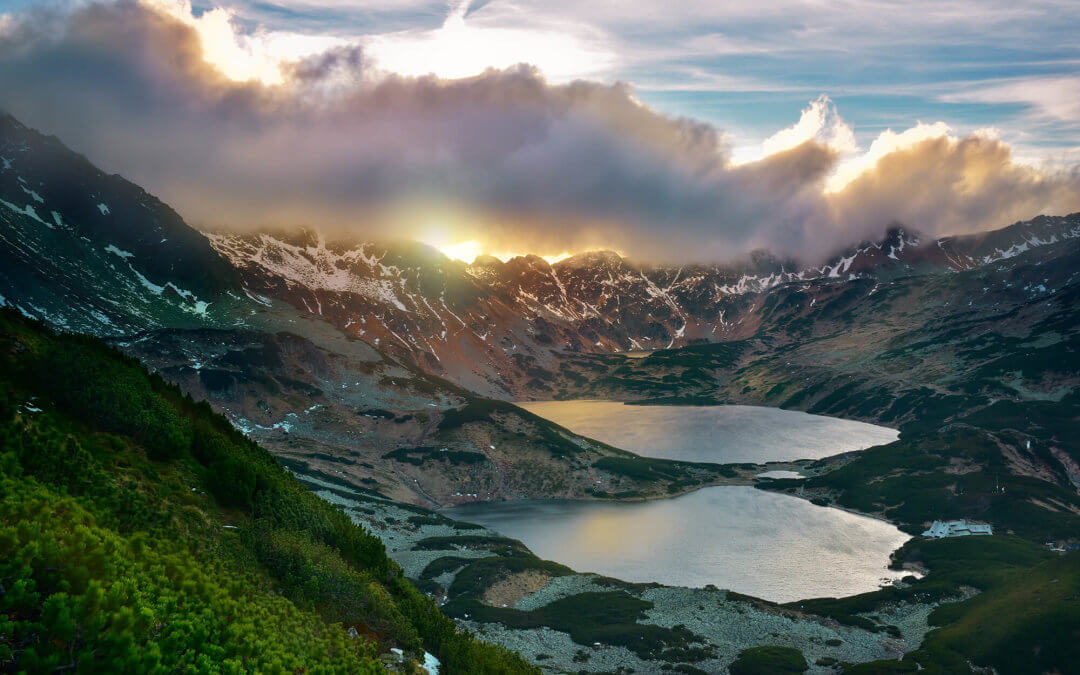Odysseus and his men sailed across the unknown, empty sea. As they travelled the nights became shorter and the days longer until they arrived in a land where night no longer existed. There was no time for sleep or rest, just the doing of an eternal day.
This was the land of the Laestrygonians.
Had Odysseus known in advance what kind of creatures lived on land he would have ordered his men to set sail and not look back until this terrible land was out of sight. But they had just endured a torrid time, when, within sight of home, they had been engulfed in a great storm and blown halfway around the world. They needed rest and resources.
He saw a calm bay, encircled by great cliffs on all sides. The other eleven ships in his fleet docked there, but something told Odysseus to hold back, to keep one ship outside the bay. As they scrambled onto dry land, he ordered three of his men to look for food and fresh water and to see if any people lived here.
The men entered the hills and soon met a girl drinking water by a spring.
“You are in the land of my father, King Antiphates”, she informed them.
The girl was unusually large, but seemed friendly, and led them to the palace. When they met the King and his wife they were terrified – both were mountain-like and hungrily snatched one of the men and, licking their lips, began to eat him. The other two tore away in terror, running all the way back to Odysseus and the ships.
Odysseus spotted his men running, with the hungry tribe of Laestrygonians in hot pursuit. Before Odysseus could do anything the Laestrygonians were hurling great boulders down in the bay where the eleven ships were anchored. The ships were splintered and ripped apart, as the wounded sailors, groan and screaming, were hurled into the churning sea. The Laestrygonians, with a ravenous endeavour, scrambled down the cliffs, waded into the sea, and began to spear the drowning sailors like fish.
There was nothing Odysseus could do for his comrades inside the bay. With his sword he cut the rope, unmooring his ship and screamed at his men:
“Row! Row for your lives!”
As the men frantically rowed away from that awful place they cried and wailed in grief and terror, as the screams of their comrades filled their ears.
They did not stop rowing until the sight of land had disappeared from the horizon. Odysseus and his men had set out for home with twelve ships. In the carnage they had lost eleven of them and all their crews. Now, only one ship remained.
It was Walter Cannon who introduced the fight/flight concept. In the late 1890’s he was researching the digestive system of animals. He observed that when an animal got stressed its digestion became disrupted. He went onto explore how the Autonomic nervous system (ANS) controls the physiology of the body in challenging situations. He called this the ‘emergency response’ which he used interchangeably with ‘fight/flight’.
Joseph LeDoux refers to the ‘defensive survival circuits’ instead of ‘fear circuits/ system’ because, he argues, they are not based on conscious feeling of fear. Instead these circuits detect threat and orchestrate defensive responses to keep the organism alive and well.
Survival systems manage interactions with the environment as part of daily quest to survive. Survival circuits are activated in situations where well-being is challenged or enhanced and the overall response is a ‘global organismic state’ involving brain and body. Activation of the defensive survival circuit results in a defensive motivational state. This is part of the task of managing resources and maximising chances of survival in situations where challenges or opportunities exist.
When we detect threat, we become highly aroused and vigilant. We focus on clear and present danger and are on alert also for other sources of harm. Eating, drinking, sex, and sleep, are suppressed.
The response of this defensive motivational state is guided by past instrumental learning, make sure the responses are suited to current circumstances. The defensive response generally facilitates approach and avoidance behaviour: escape or the avoidance of danger, and the movement towards resources like food or drink as part of an effort to survive and thrive.

